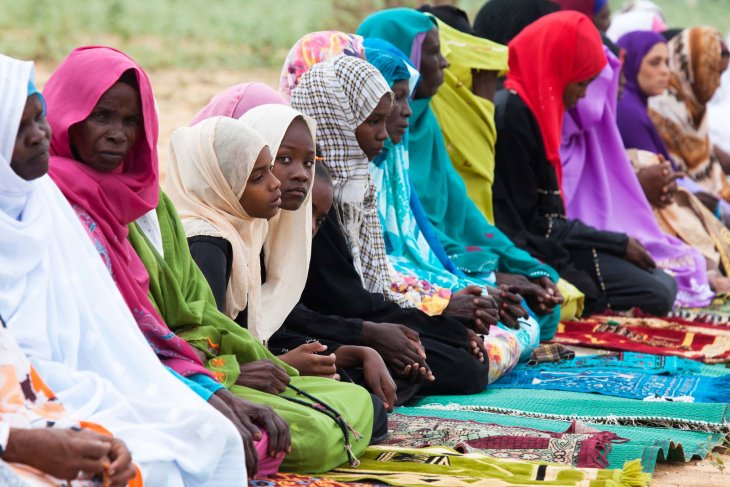
Sudanese muslims from El Fasher, North Darfur, attend the morning prayer at the outskirts of the city to celebrate the Eid ul-Fitr, the feast marking the end of the fast of Ramadan in 2012. Photo: Albert González Farran – UNAMID
Today is Eid, the Muslim festival that marks the end of Ramadan, the month of fasting. Families and friends will gather today to enjoy good food and each other’s company. Many Norwegian Muslim children look forward to celebrating Eid, and for many people the social aspects are just as important as the festival’s religious significance. In addition, many Muslims use Eid as an occasion to help those who are less fortunate, by making their annual payment of obligatory alms (zakat in Arabic), which in Sunni Islam are equivalent to 2.5 percent of annual income after living expenses. Zakat is one of the five pillars of Islam, together with the Declaration of Faith, Prayer, Fasting during the month of Ramadan, and the Pilgrimage to Mecca.
Zakat payments are usually made in connection with the festival of Eid. Ramadan, the month of fasting, has been a period of cleansing, self-denial and spiritual development. Many people use this time as an opportunity to share their good fortune with people who have less. We see this in Norway, too. We know from our previous research into Muslims’ enthusiasm for helping the poor that Muslims in Oslo are enthusiastic supporters of various types of charitable, humanitarian and development initiatives.
Religion and economic priorities
In a current research project at the Peace Research Institute Oslo (PRIO), funded by the Research Council of Norway (FINEX – Financial exclusion, Islamic finance and housing in the Nordic countries), we are focusing on religion and economic priorities among Muslims in the Nordic countries. There is little existing research into these topics.
In autumn 2018, we conducted a questionnaire-based survey of Muslims in the Nordic countries, with a focus on issues relating to religion and economics. In addition, we have collated a large quantity of data from interviews with individuals and focus groups. Over the coming year we will present our findings in a series of articles and in a report on our findings from the questionnaire. But we think that much of what we are seeing in our data is so interesting that we want to highlight some results of particular on the day of this important Muslim festival.
Our questionnaire was completed by around 2,500 people living in the Nordic countries. All considered themselves to be Muslim. Thus, we included people with backgrounds from Asia, the Middle East and Africa, as well as from European countries. The study is not statistically representative of the Muslim population of the Nordic countries as a whole.
However, it provides a bird’s-eye view of the enormous diversity that exists among the backgrounds of Nordic Muslims. It also tells us something about patterns in attitudes and behaviour among Muslims from different backgrounds, with a particular focus on the relationship between economics and religion. Most of these attitudes and behaviours are invisible to society at large. So let us present three findings from our research:
- Most pay the religious tax or zakat. The trends revealed in our data were clear. Among our respondents around 70 percent responded that they paid zakat. There was little difference between men and women, but slightly more women than men stated that they paid zakat last year.
- Complex motives: Religious and social motivations were intertwined in the people in our survey. Religious traditions such as zakat are closely linked to social engagement, as they provide a means of alleviating poverty and assisting people in need. Sometimes it can be meaningless to try to distinguish between religious and social motivations. We already knew from our previous research that there is a high level of social engagement among Norwegian Muslims, and we see that this engagement is approximately the same regardless of whether people say that religion is important in their lives.
- Generosity is hereditary: Another interesting finding is that the level of generosity exhibited by Muslims who are immigrants does not seem to differ greatly from the level exhibited by their Norwegian-born children. We know that many of those who are immigrants have strong links to their countries of origin. They often have family obligations and a desire to help people in their countries of origin. But the desire to help others by paying zakat is being passed on to the next generation. In particular, their Norwegian-born children are continuing to donate both to individuals and to institutions here in Norway and abroad.
No one should be surprised that religion – and culture – are important for determining people’s financial values and priorities. This is especially true in Norway, where strong religious leaders such as Hans Nielsen Hauge have exerted a huge influence on our attitudes to work and economic values and activity. We also find many of the roots of sociology in the debate about the significance of Protestant Christianity on the development of modern capitalism. Thus, we believe that the topics of our research are of key scholarly importance, and we look forward to analyzing in greater detail our data on Nordic Muslims’ economic values and practices, and to making our findings public. Meanwhile, we wish all Muslims: Eid Mubarak! Happy Eid!
- Translation: Fidotext
Yes it is hard to distinguish between religion and social motivation but generally Muslims the world over are generous people.